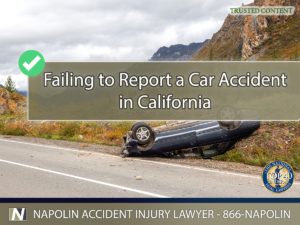Failing to Report a Car Accident in California: Legal Consequences and How to Protect Your Rights
Introduction to Failing to Report a Car Accident in California: Legal Consequences and How to Protect Your Rights
In the aftermath of a car accident, California law mandates certain responsibilities for drivers. Among these responsibilities is the legal requirement to report most car accidents. Understanding these requirements is essential not only for legal compliance but also for protecting one's rights, especially when it comes to insurance claims. This article explores the specific laws governing car accident reporting in California and offers guidance on how to navigate these complex legal obligations.

California Law for Reporting Car Accidents
California Law for Reporting Car Accidents
Requirements under California Vehicle Code §20008
California Vehicle Code §20008 requires drivers to report car accidents involving injuries or fatalities to the California Highway Patrol or local law enforcement within 24 hours after the accident. Commercial carrier vehicle owners and drivers have a 10-day window to file a report with the California Highway Patrol.
How to Report a Car Accident in California
Calling 911 is often the quickest and easiest way to report a car accident in California. The operator will ask for the accident's location and whether anyone is injured, ensuring the correct law enforcement agency is dispatched to the scene.
Reporting to the California Department of Motor Vehicles
In addition to police reporting, California law mandates reporting the crash to the California DMV. California Vehicle Code §16000 requires drivers to report crashes causing $1,000 or more in property damage, injuries, or death to the California DMV within ten days. This report is filed using Form SR-1.
Consequences of Failing to Report a Car Accident
Legal Penalties and Criminal Charges
Failure to report a car accident as required by California law can lead to a suspension of the driver's license. In some cases, criminal charges, fines, and other penalties may be imposed.
Insurance Requirements and Reporting
California requires drivers to have a minimum amount of car insurance coverage. It's essential to report crashes to your insurance provider but not to the other driver's insurance company. Speaking with insurance adjusters without legal guidance can jeopardize your claim.

Steps to Take After a Car Accident in California
Steps to Take After a Car Accident in California
Gathering Evidence and Seeking Medical Care
After reporting the accident, gathering evidence at the scene and seeking prompt medical care are vital steps. These actions not only protect your health but also strengthen your personal injury claim.
Documenting Damages and Seeking Legal Advice
Keeping detailed records of all damages and consulting with an experienced lawyer can further protect your rights and ensure fair compensation.

Failing to Report a Car Accident in California
Conclusion to Failing to Report a Car Accident in California: Legal Consequences and How to Protect Your Rights
The legal obligations surrounding car accident reporting in California are complex but essential to understand. Failing to comply can have serious legal consequences. By following the law and seeking professional legal guidance, drivers can protect their rights and interests. If you've been involved in a car accident in California and need legal assistance, call Napolin Accident Injury Lawyer at (866)-NAPOLIN. With extensive litigation experience in this area, we offer a free consultation to help you navigate the legal complexities of car accident reporting and ensure your rights are protected.
- Understanding Uber Accidents and Insurance Coverage Periods in California - April 8, 2025
- A Guide on Red Light Auto Accidents in California - August 14, 2024
- Self-Representing in a California Personal Injury Claim - August 13, 2024
